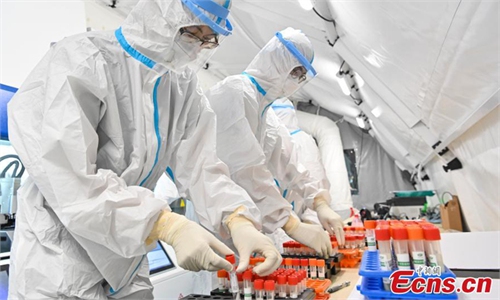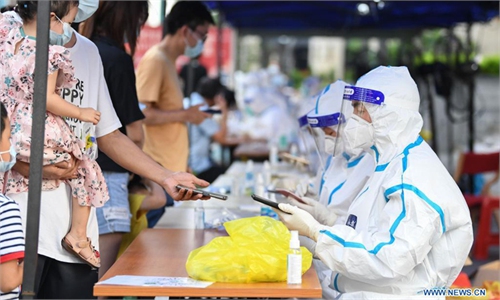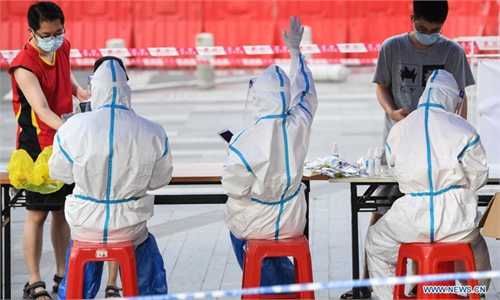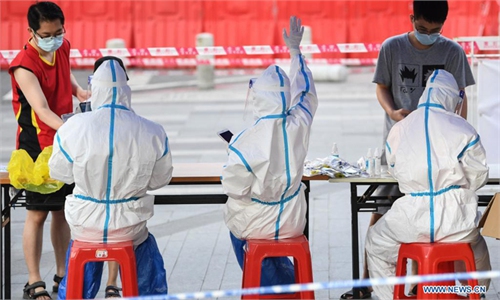Guangzhou’s fight against Delta variant sounds alarm for other cities in preventing variant strains: experts
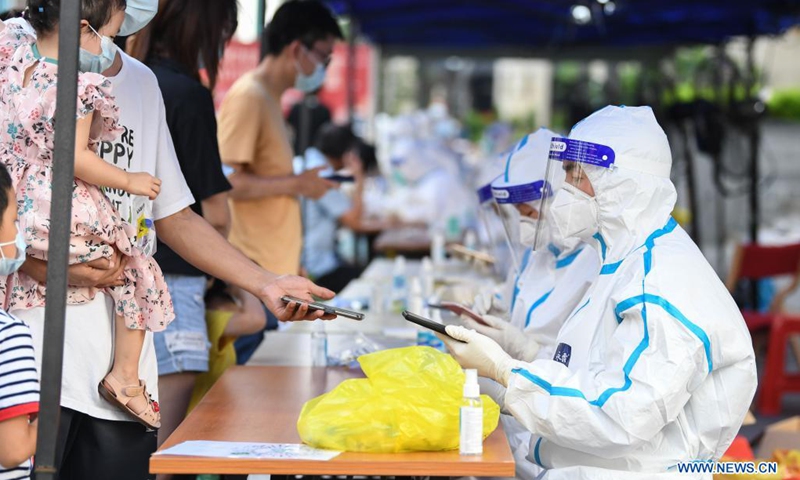
People have their information registered before COVID-19 nucleic acid testing in Liwan District of Guangzhou, south China's Guangdong Province, June 8, 2021. A new round of mass testing in high-risk areas of Baihedong Street and Zhongnan Street in Guangzhou started on Tuesday.(Photo: Xinhua)
Guangzhou in South China's Guangdong Province has basically brought the latest outbreak under control as it recorded less than five new COVID-19 cases daily for five consecutive days since Sunday, with zero cases reported on Tuesday. Experts said that Guangzhou's fight against the Delta variant should sound the alarm for other cities in China in preventing variant strains.
This is the first time that the Delta variant strain has caused an outbreak in China.
"Guangzhou has performed well this time against the mutation," Zeng Guang, a former chief epidemiologist of the Chinese Center for Disease Control and Prevention, told Global Times on Thursday.
The mutation is highly infectious with strong pathogenicity, wreaking havoc in many other countries and regions, including some Southeast Asian countries like Vietnam, which have performed well in preventing other mutations, Zeng noted.
"The easing epidemic situation in Guangzhou demonstrates that the virus management strategy has survived the test of a severe mutation," Zeng said.
At the same time, there are also lessons that can be learned from the latest outbreak in Guangzhou, such as the prevention work at quarantine facilities, the screening of close contacts, and the work preventing staff from becoming infected. All work should be conducted with a great deal of care, experts noted.
Experts said that the outbreak in Guangzhou has rung the alarm for cities across China as many of them have most likely relaxed their vigilance due to the controlled state of the pandemic in China.
Yang Zhanqiu, a deputy director of the pathogen biology department at Wuhan University, suggested conducting more nucleic acid tests during the quarantine period.
Currently, international arrivals need to accept four nucleic acid tests separately on the first, the seventh, the 14th and the 21st day of quarantine after entering Guangzhou.
But as the incubation period of the mutation discovered in India is only 2-3 days. It is better to make international arrivals accept testing every three days in order to track down cases in time, Yang told the Global Times on Thursday.
Yang noted that although Guangzhou is witnessing an easing epidemic situation, the city should remain vigilant and implement strict anti-virus management to ensure a safe environment for an array of upcoming major events in the second half of the year, including the senior high school entrance exam delayed until July and celebrations for the 100th anniversary of the founding of the Communist Party of China, in addition to the fall semester that will begin in September.
This round of the virus surge in the city has seen 151 locally transmitted COVID-19 cases reported as of Wednesday starting from May 21, including 144 confirmed cases and seven asymptomatic infections. All people infected by this round of the outbreak are currently receiving treatment at the Eighth People's Hospital of Guangzhou.
Some areas which have been under lockdown were reopened with the easing of the outbreak. As part of scientific epidemic prevention and control measures amid the latest surge, six areas from three districts were approved to exit lockdown status on Wednesday. Eleven other areas in the city left lockdown status on Monday.
